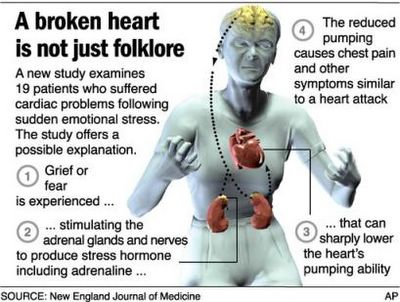
Let's see . . . what shall I blog about today? Global warming? Negativland? Dharma teachings? I think I've covered all of those recently. How about this, then: last night, L. and I broke up again, after only about a month back together.
The Buddha taught that our suffering comes from our attachments. Not recognizing the emptiness of all things, we fail to grasp their impermanence and wish that those things we cherish could last forever. But life is change, and we're disappointed when we realize that everything is temporary, that nothing lasts forever.
The secret of happiness is simply accepting the brief moments of joy when they occur, and not cling to them or try to make them last any longer than they would on their own. It's like holding water in your hands, the tighter you squeeze it, the more it just squirts out. It's better just to let it run naturally through your fingers, like a hand under a faucet, than to try to hold on to it.
A broken heart harms your health
by Jessica Ebert,
Nature, February 9, 2005
Emotional stress causes an unusual type of heart disease.

Being 'broken-hearted' as a result of emotional trauma may be a more apposite turn of phrase than we imagined. US researchers have shown how sudden emotional stress can release hormones that stun the heart into submission, resulting in symptoms that mimic a typical heart attack.
People suffering from stress cardiomyopathy, or 'broken-heart syndrome', seem to be having a heart attack: they have chest pain, fluid in the lungs, shortness of breath and heart failure. But although the ability of the heart to pump is significantly reduced and the heart muscle is weakened, it is not killed, or infarcted, as in a classic attack.
"The tissue is alive," says Hunter Champion of Johns Hopkins Hospital in Baltimore, Maryland, who led the study. "It's just not moving."
The researchers found that initial levels of hormones called catecholamines (particularly adrenaline) in the patients with broken heart syndrome were 2 to 3 times greater than those in classic heart-attack patients, and between 7 and 34 times greater than in healthy people. "This is the first time the strong association of elevated catecholamine levels and this syndrome has been shown," says Dr. Champion.
Stress cardiomyopathy has been known for ten years in Japan, where it is called takotsubo cardiomyopathy, after an octopus trap with a round bottom that resembles the appearance of a stunned heart. The disease has so far gone relatively unrecognized in the West, but studies such as Dr. Champion's are bringing it to the fore.
It will be important that doctors appreciate the difference between broken-heart syndrome and classic heart disease when examining patients. By spotting broken-heart sufferers, unnecessary procedures could be averted. What's more, as doctors learn to recognize the syndrome's unique features, more cases are likely to be documented.
"This may be the tip of the iceberg," says Dr. Champion. "It may occur much more frequently than we think."
Great. Now I may not even make it to May 5, 2028 after all . . .

No comments:
Post a Comment